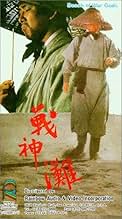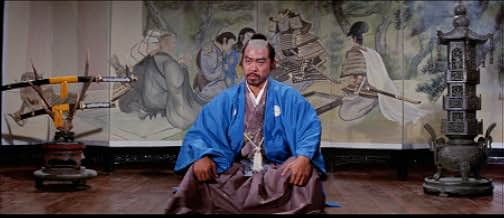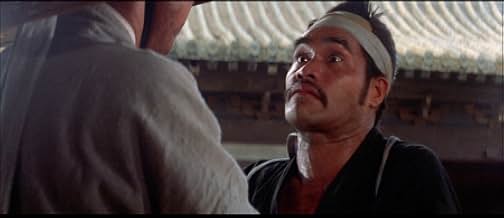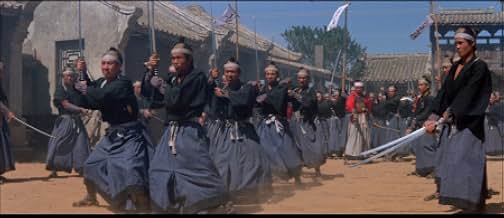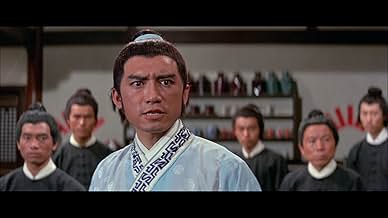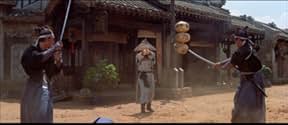IMDb-BEWERTUNG
6,8/10
359
IHRE BEWERTUNG
Füge eine Handlung in deiner Sprache hinzuDuring the Ming dynasty, a courageous swordsman gathers five other fighters and rallies the local fishermen to fight off a band of Japanese invaders.During the Ming dynasty, a courageous swordsman gathers five other fighters and rallies the local fishermen to fight off a band of Japanese invaders.During the Ming dynasty, a courageous swordsman gathers five other fighters and rallies the local fishermen to fight off a band of Japanese invaders.
Empfohlene Bewertungen
In BEACH OF THE WAR GODS, an action-packed Hong Kong swordplay adventure from 1973, Jimmy Wang Yu rallies three fighters to help lead the men of a Chinese beach town in battle against the invading Japanese. One of the fighters is an expert knife thrower and comes with his own arsenal. It all leads quickly to a massive battle in the town streets. The swordfights are reminiscent of those found in Japanese samurai films, but with more action and vigor. (Interestingly, Wang Yu often made kung fu films with anti-Japanese themes, yet his films often reflected the influence of Japanese samurai films. This one, in particular, explicitly recalls Akira Kurosawa's SEVEN SAMURAI.)
The film could have used more buildup to the main battle, more training scenes, and more character development. After a simple setup, Wang Yu and company gather and prepare for battle. Then--boom!--the battle begins and lasts till the end of the film! The humble villagers we've met earlier are all now skilled uniformed fighters taking on hardened Japanese swordsmen with a range of sophisticated tactics. Action fans will love it, but those seeking a little more depth and substance may feel unsatisfied. Still, the impressive battle scenes are very well staged and photographed on a sprawling beach and a massive period backlot set. Wang Yu not only stars, but wrote and directed the film as well.
The film could have used more buildup to the main battle, more training scenes, and more character development. After a simple setup, Wang Yu and company gather and prepare for battle. Then--boom!--the battle begins and lasts till the end of the film! The humble villagers we've met earlier are all now skilled uniformed fighters taking on hardened Japanese swordsmen with a range of sophisticated tactics. Action fans will love it, but those seeking a little more depth and substance may feel unsatisfied. Still, the impressive battle scenes are very well staged and photographed on a sprawling beach and a massive period backlot set. Wang Yu not only stars, but wrote and directed the film as well.
At the heart of the incredibly titled Beach of the War Gods is a beautiful paradox, one built upon love and shame, it's wuxia mayhem by way of Kurosawa and Leone all filtered through the eyes of Jimmy Wang Yu. Whilst hand-to-hand combat had started to become the name of the game following the dawn of the 1970s, this film sees Wang Yu take a decisive step back from what he was more well-known for, to make a film in the genre that had previously dominated, the wuxia. Granted, it does look a little rougher around the edges than many of its contemporaries, but its ambition and scope are to be marvelled at. Wang Yu makes fabulous use of the wide frame with some brilliantly composed and thoroughly beautiful shots sprinkled throughout. It's enriched with depth, movement and a constant visual interest to keep you engrossed with wind machines regularly blasting away, waves crashing dramatically and fire adding powerful amounts of colour. And this is all before I mention the film's awe-inspiring and action-packed finale that brings 25 minutes of uninterrupted magnificence to the forefront. Yes, the characters and plot are exceptionally flimsy and the dialogue is superficial at best; yet the stripped-back approach works in Beach of the War Gods' favour, never intruding upon its gloriously bloody action and rushing towards its lengthy, epic final battle without any fat getting in the way.
I found this movie in an old shop and bought it just for fun,not thinking it would be nothing other than an ordinary old Hong-Kong movie(badly dubbed and often lame fighting).Boy was i wrong!The main actors in this movie is the kind of people that you just can`t help finding cool whatever they do.Since this is a Golden Harvest production the sets,costumes and props are well made.The directing by Wang Yu is superb,his visual style of camera angles and the use of slow-motion is just like the movies are made today.The fight-choreographing is sharp,and visually stunning.Compared with other movies from Hong-Kong,usually filled with rain of blood,this movie is more clean.I`m quite used to large bodycounts in any hong-kong movie,but this movie takes killing to a new level.The final battle between the chinese and the japanese is nothing other that a long massacre with people filling your Tv-screen.The only bad about this movie is the dubbing,i only hope that this movie some day will be released on DVD with the original cantonese language.
This is one of many, of my favourite Jimmy Wang Yu films. Written and directed by the man himself, this early Golden Harvest production has always sat strong with me and is a classic that I would love to see cleaned up and restored for a Blu-ray release. A take on the classic Seven Samurai, Wang Yu plays a stranger who turns up at a coastal town and offers to protect it from an army of Japanese invaders. Setting out to gather his own small army of fighters, Wang Yu finds its not as easy as he had hoped, but soon finds the people he needs to help defend the town one of which is the mysterious knife-throwing killer played by Tin Yau, co-star of many Wang Yu films!
Nicely shot and neatly directed, the only main flaw of the awesomely titled Beach Of The War Gods would be the lack of characterisation. While hardly a major downfall, the clear focus is on the fighting here which comes fast and often, in a barrage of hand-to-hand combat, samurai-inspired swordplay, and other wild weapons. The fights are handled by Hsiao Pao who also choreographed the action in one of my guilty pleasures, Vampire Settled On Police Camp (with Sandra Ng), who is joined by veteran Kuan Hung who worked with Wang Yu on the One Armed Boxer 1 & 2 as well as many more of his classics...
Wang Yu directs as Wang Yu does. While it may have the polish of a high-end production, there's still a rawness to his style. The sets and costumes are fantastic, and the most (if not all) of the cast do a great job. There are plenty of great visuals that, again, would look amazing in a restored version.
The Japanese are led by Wang Yu film regular Lung Fei, bad guy of a thousand classics, who (at the 50 minute mark) leads his men on the beach for battle at night, resulting in a major loss of men due to Wang's preparation. A second attempt the following morning begins a breathtaking, half hour of constant fighting which does not disappoint!
Literally 30 minutes of wonderful action rushes by, inspired by the classic Samurai films of Japanese cinema, with Wang Yu's unique touch and a body count equal on both sides. As the battle spreads out and the enemy get lost in the streets of the town, the newly trained local fighters do their best to take them down. Make no mistake, there is no holding back here as tens of men leap from rooftops in unison, a thousand blades flash across the screen, and lengthy one-shots track through the carnage without a hiccup.
Wang Yu is just brilliant here as he cuts through the enemy with more speed and ferocity than usual - his white robes gradually getting redder with blood as he fights on. It seems that with this action-packed-half-hour, that every 10 minutes that pass, Wang Yu ramps things up even more with harder violence, faster fights, and the carnage that ensues once Lung Fei joins the battle. It is an ending that, alone, rivals the greatest Shaw Brothers masterpiece!
Believe it or not, after all that and a 2 minute breather, the film closes with a lengthy one-to-one as the awesome Jimmy Wang Yu takes on Lung Fei in a fight to the death. Its a fantastically choreographed fight scene on and around a windmill on the beach (including a great WTF moment), and overall, a highly impressive, action-packed 40 minute finale...
Overall: An incredible piece of martial arts cinema, Beach Of The War Gods is one of Wang Yu's greatest moments, and an absolute classic!
Nicely shot and neatly directed, the only main flaw of the awesomely titled Beach Of The War Gods would be the lack of characterisation. While hardly a major downfall, the clear focus is on the fighting here which comes fast and often, in a barrage of hand-to-hand combat, samurai-inspired swordplay, and other wild weapons. The fights are handled by Hsiao Pao who also choreographed the action in one of my guilty pleasures, Vampire Settled On Police Camp (with Sandra Ng), who is joined by veteran Kuan Hung who worked with Wang Yu on the One Armed Boxer 1 & 2 as well as many more of his classics...
Wang Yu directs as Wang Yu does. While it may have the polish of a high-end production, there's still a rawness to his style. The sets and costumes are fantastic, and the most (if not all) of the cast do a great job. There are plenty of great visuals that, again, would look amazing in a restored version.
The Japanese are led by Wang Yu film regular Lung Fei, bad guy of a thousand classics, who (at the 50 minute mark) leads his men on the beach for battle at night, resulting in a major loss of men due to Wang's preparation. A second attempt the following morning begins a breathtaking, half hour of constant fighting which does not disappoint!
Literally 30 minutes of wonderful action rushes by, inspired by the classic Samurai films of Japanese cinema, with Wang Yu's unique touch and a body count equal on both sides. As the battle spreads out and the enemy get lost in the streets of the town, the newly trained local fighters do their best to take them down. Make no mistake, there is no holding back here as tens of men leap from rooftops in unison, a thousand blades flash across the screen, and lengthy one-shots track through the carnage without a hiccup.
Wang Yu is just brilliant here as he cuts through the enemy with more speed and ferocity than usual - his white robes gradually getting redder with blood as he fights on. It seems that with this action-packed-half-hour, that every 10 minutes that pass, Wang Yu ramps things up even more with harder violence, faster fights, and the carnage that ensues once Lung Fei joins the battle. It is an ending that, alone, rivals the greatest Shaw Brothers masterpiece!
Believe it or not, after all that and a 2 minute breather, the film closes with a lengthy one-to-one as the awesome Jimmy Wang Yu takes on Lung Fei in a fight to the death. Its a fantastically choreographed fight scene on and around a windmill on the beach (including a great WTF moment), and overall, a highly impressive, action-packed 40 minute finale...
Overall: An incredible piece of martial arts cinema, Beach Of The War Gods is one of Wang Yu's greatest moments, and an absolute classic!
I love when you watch a film for the first time and are so surprised how good it is. I heard about this film from Quentin Tarantino talking about it on his podcast. I was totally enthralled the whole time and didn't want it to end. Top notch script and beautifully shot. One of my favorite shots is when the Japanese are on the beach holding torches in complete darkness. You get a sense of doom watching this and you are just hoping that the good guys can pull through. Great performances as well. Jimmy Wang Yu is a very talented director and I'll definitely be exploring more of his catalog. Everyone loves a good underdog story and this is one of the bests. Highly recommended!
WUSSTEST DU SCHON:
- VerbindungenReferenced in Gangsters: Enter the White Devil (1978)
Top-Auswahl
Melde dich zum Bewerten an und greife auf die Watchlist für personalisierte Empfehlungen zu.
Details
- Laufzeit1 Stunde 40 Minuten
- Sound-Mix
- Seitenverhältnis
- 2.35 : 1
Zu dieser Seite beitragen
Bearbeitung vorschlagen oder fehlenden Inhalt hinzufügen

Oberste Lücke
By what name was Die Todesbucht der Shaolin (1973) officially released in India in English?
Antwort
